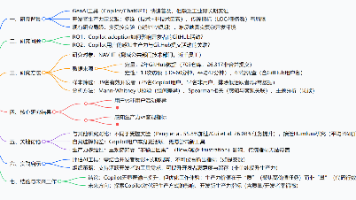java https 单向认证_Java Https单向,双向验证
https一般来说有单项SSL和双向SSL连接之分。单项SSL连接,也就是只是客户端验证服务器证书。tomcat中clientAuth="false"的时候,HTTPS单向验证如下:importjava.io.BufferedReader;importjava.io.InputStreamReader;importjava.io.OutputStream;importjava.net.UR...
https一般来说有单项SSL和双向SSL连接之分。
单项SSL连接,也就是只是客户端验证服务器证书。tomcat中clientAuth="false"的时候,HTTPS单向验证如下:
import java.io.BufferedReader;
import java.io.InputStreamReader;
import java.io.OutputStream;
import java.net.URL;
import java.util.Date;
import javax.net.ssl.HostnameVerifier;
import javax.net.ssl.HttpsURLConnection;
import javax.net.ssl.SSLSession;
import org.apache.commons.logging.Log;
import org.apache.commons.logging.LogFactory;
public class ClientSendData {
static Log log = LogFactory.getLog(ClientSendData.class);
//客户端信任的证书 private String sslTrustStore;
private String sslTrustStorePassword;
private String Url;
//初始化数据 public ClientSendData() {
sslTrustStore = "D:/ssl/clientTrust.jks";
sslTrustStorePassword = "123456";
Url = "https://test.yihaodian.com:8443/ims/feedbackToPingAn_getData.action";
}
public String sendData(String data) {
String receivedData = null;
try {
//设置系统参数 System.setProperty("javax.net.ssl.trustStore", sslTrustStore);
System.setProperty("javax.net.ssl.trustStorePassword",
sslTrustStorePassword);
receivedData = send(Url, data);
} catch (Exception e) {
e.printStackTrace();
}
return receivedData;
}
public static String send(String sendurl, String sendData)
throws Exception {
URL url = new URL(sendurl);
HostnameVerifier hv = new HostnameVerifier() {
public boolean verify(String urlHostName, SSLSession session) {
return true;
}
};
System.setProperty("java.protocol.handler.pkgs","sun.net.www.protocol");
HttpsURLConnection.setDefaultHostnameVerifier(hv);
Date current = new Date(System.currentTimeMillis());
log.info("begint to open connection at " + current);
HttpsURLConnection connection = (HttpsURLConnection) url.openConnection();
Date end = new Date(System.currentTimeMillis());
log.info("open connection ok at " + end + ",cost:"+ (end.getTime() - current.getTime()));
connection.setRequestProperty("Content-Type", "text/xml");
connection.setDoOutput(true);
connection.setDoInput(true);
connection.setRequestMethod("POST");
connection.setUseCaches(false);
connection.setReadTimeout(30000);
byte data[] = sendData.getBytes();
current = new Date(System.currentTimeMillis());
log.info("[SSLIX]notifyEai,begint to write data at " + current);
OutputStream out = connection.getOutputStream();
out.write(data);
end = new Date(System.currentTimeMillis());
log.info("write data ok at " + end + ",cost:"
+ (end.getTime() - current.getTime()));
StringBuffer receivedData = new StringBuffer();
current = new Date(System.currentTimeMillis());
log.info("begint to read data at " + current);
InputStreamReader inReader = new InputStreamReader(connection
.getInputStream(), "UTF-8");
BufferedReader aReader = new BufferedReader(inReader);
String aLine;
while ((aLine = aReader.readLine()) != null) {
receivedData.append(aLine);
}
end = new Date(System.currentTimeMillis());
log.info("read data ok at " + end + ",cost:"
+ (end.getTime() - current.getTime()));
log.info("开始返回状态码");
Integer statusCode = connection.getResponseCode();
log.info("返回状态码:" + statusCode);
aReader.close();
connection.disconnect();
return receivedData.toString();
}
public static void main(String[] args) {
ClientSendData t = new ClientSendData();
t.sendData("测试SSL单项连接,向服务端发送数据!");
}
}
单项认证时,只需要设置客户端信任的证书库就行。但是当是双向认证时,还需要设置客户端密钥库密码。
HTTPS双向验证代码如下:
public class ClientSendData {
static Log log = LogFactory.getLog(EaiChannel.class);
//客户端密钥库 private String sslKeyStorePath;
private String sslKeyStorePassword;
private String sslKeyStoreType;
//客户端信任的证书 private String sslTrustStore;
private String sslTrustStorePassword;
private String eaiUrl;
//初始化数据 public ClientSendData() {
sslKeyStorePath = "D:/ssl/clientKeys.jks";
sslKeyStorePassword = "123456";
sslKeyStoreType = "JKS"; //密钥库类型,有JKS PKCS12等 sslTrustStore = "D:/ssl/clientTrust.jks";
sslTrustStorePassword = "123456";
eaiUrl = "https://test.yihaodian.com:8443/ims/feedbackToPingAn_getData.action";
}
public String sendData(String data) {
String receivedData = null;
try {
System.setProperty("javax.net.ssl.keyStore", sslKeyStorePath);
System.setProperty("javax.net.ssl.keyStorePassword",sslKeyStorePassword);
System.setProperty("javax.net.ssl.keyStoreType", sslKeyStoreType);
//设置系统参数 System.setProperty("javax.net.ssl.trustStore", sslTrustStore);
System.setProperty("javax.net.ssl.trustStorePassword",
sslTrustStorePassword);
receivedData = send(eaiUrl, data);
} catch (Exception e) {
e.printStackTrace();
}
return receivedData;
}
public static String send(String sendurl, String sendData)
throws Exception {
//和上面一样 }
public static void main(String[] args) {
ClientSendData t = new ClientSendData();
t.sendData("测试SSL双项连接,向服务端发送数据!");
}
}
下面来说说可能会遇到的异常:
1. java.security.NoSuchAlgorithmException
一般来说是密钥库类型不对,如上面的sslKeyStoreType = "JKS" 却写成PKCS12。
也有可能是证书的问题。
2. java.net.UnknownHostException
服务端地址不对。
3.java.net.SocketException: Unexpected end of file from server
这个异常和客户端没有关系,说明已经发送成功。是服务端的问题。有可能是防火墙的原因,也可能是服务端没处理客户端的响应。
另外有人说当URL过长时也会发生此错误,当使用URL发送数据时,可以参考此意见。
4.java.io.IOException:server returned HTTP response code :500
这个异常是服务端代码的问题。服务端相应代码执行时抛出了异常。
最后 如果返回的状态码是200 ,表示成功。
更多推荐
 已为社区贡献1条内容
已为社区贡献1条内容









所有评论(0)